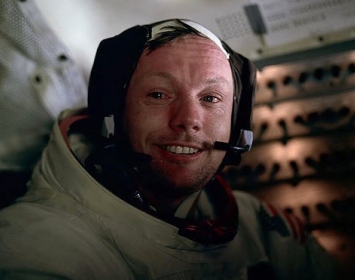US astronaut Neil Armstrong dies
US astronaut Neil Armstrong, the first man on the Moon, has died aged 82. A statement from his family says he died from complications from heart surgery he had earlier this month.
He set foot on the Moon on 20 July 1969, famously describing the event as "one small step for a man, one giant leap for mankind". US President Barack Obama said Armstrong was "among the greatest of American heroes – not just of his time, but of all time".
Last November he received the Congressional Gold Medal, the highest US civilian award. He was the commander of the Apollo 11 spacecraft. More than 500 million TV viewers around the world watched its touchdown on the lunar surface. Armstrong and fellow astronaut Edwin "Buzz" Aldrin spent nearly three hours walking on the moon, collecting samples, conducting experiments and taking photographs. "The sights were simply magnificent, beyond any visual experience that I had ever been exposed to," Armstrong once said.
Mr Aldrin told the BBC’s Newshour programme: "It’s very sad indeed that we’re not able to be together as a crew on the 50th anniversary of the mission. I will remember him as a very capable commander."
Apollo 11 was Armstrong’s last space mission. In 1971, he left the US space agency Nasa to teach aerospace engineering. Born in 1930 and raised in Ohio, Armstrong took his first flight aged six with his father and formed a lifelong passion for flying. He flew Navy fighter jets during the Korean War in the 1950s, and joined the US space programme in 1962.
Correspondentssay Armstrong remained modest and never allowed himself to be caught up in the glamour of space exploration. “I am, and ever will be, a white-socks, pocket-protector, nerdy engineer," he said in February 2000, in a rare public appearance.
In a statement, his family praised him as a "reluctant American hero" who had "served his nation proudly, as a navy fighter pilot, test pilot, and astronaut". The statement did not say where Armstrong died. He had surgery to relieve four blocked coronary arteries on 7 August.
statement– nyilatkozat
complication – komplikáció
heart surgery – szívműtét
to describe – leír, körülír
event – esemény
giant – óriási
leap – felfedezés, ugrás
mankind – emberiség
civilian – civil, polgári
award – díj
commander – parancsnok
spacecraft – űrhajó
TV viewer – tévénéző
touchdown – földetérés, leszállás
lunar – hold-, holddal kapcsolatos
surface – felszín
fellow astronaut – űrhajós társ
to collect samples – mintákat gyűjt
to conduct experiments – kísérleteket végez
sight – látvány
magnificent – nagyszerű, pazar
visual experiencing – vizuális élmény
to be exposed to – valaminek kitéve lenni
crew – legénység
anniversary – évforduló
aerospace engineering – repülőmérnök
to be raised – felnevelve lenni
to form a passion for – szenvedély alakul ki benne valami iránt
lifelong – élethosszig tartó
fighter jet – vadászrepülő
to join – csatlakozik
correspondent – tudosító
to remain – megmarad
modest – szerény
to allow oneself to –megengedi magának, hogy
glamour – varázslat, csillogás
exploration – felderítés, feltárás
nerdy – unalmas/számítógép és technikai kütyük bolondja
rare – ritka
public appearance – nyilvános szereplés
to praise – magasztal
reluctant – kelletlen/vonakodó
to serve one’s nation – a hazáját szolgálja
proudly — büszkén
blocked – elzáródott
coronary artery – szívkoszorúér



